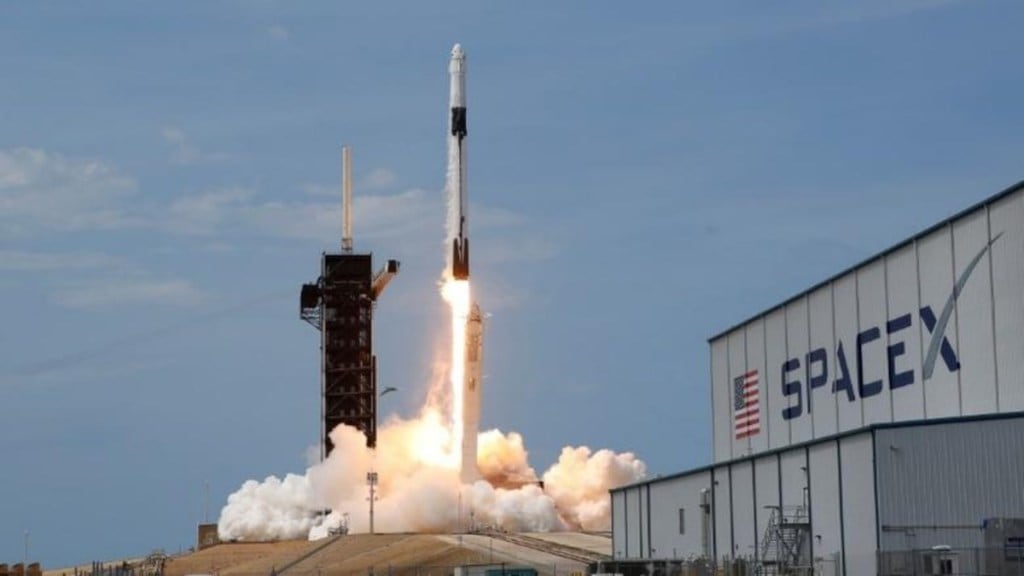By Girish Linganna
In a significant development for the Indian space industry, Elon Musk’s Space Exploration Technologies Corporation, popularly known as SpaceX, is set to launch the first satellite of Indian startup Azista BST Aerospace Pvt Ltd. This announcement was made by top officials of the Indian company, marking a significant milestone in the country’s space exploration journey.
Azista BST Aerospace’s 80 kg satellite, named ABA First Runner (AFR), is a remote sensing satellite expected to be launched in the middle of June 2023. Sunil Indurti, the Director of Azista BST Aerospace, shared this news with the Indian News Service (IANS).
Azista BST Aerospace is an Indo-German satellite manufacturing joint venture, with India’s Azista Industries Pvt. Ltd holding a 70 percent stake and Berlin Space Technologies GmbH holding the remaining 30 percent. The company is currently funded by Azista Industries and has expressed a long-term business outlook, choosing to stay away from venture capital funding.
Sunil Indurti, an engineering graduate from the esteemed College of Engineering, Guindy in Chennai, ventured into the space sector after founding and exiting an ice cream parlour chain in Hyderabad. His ambition during his college days was to build a national brand. After exiting the ice cream venture, Indurti met Srinivas Reddy Male, Managing Director and a Director with pharma company Hetero, and both decided to venture into satellite manufacturing.
The company initially started as a vendor for the Indian Space Research Organisation (ISRO) and set up a factory in Ahmedabad, Gujarat. They have also established weather stations for the Defence Research and Development Organisation (DRDO) and others.
When asked about the choice of SpaceX’s Falcon 9 rocket over India’s own Polar Satellite Launch Vehicle (PSLV) of ISRO, Indurti explained that SpaceX had the slot for the satellite in its rocket. At the time Azista BST Aerospace booked its slot on the Falcon 9 rocket, the Indian space sector was undergoing changes with the establishment of a regulator for private players. Unlike SpaceX, which launches several rockets in a year, ISRO’s PSLV launches are relatively infrequent. However, Indurti acknowledged that ISRO is competitive in terms of launch costs.
Azista BST Aerospace is yet to decide on owning a constellation of satellites and generating revenue from selling the data. As for the challenges in local sourcing of satellite components, Indurti mentioned that semiconductor chips have to be imported and are not easy to localise. The satellite reaction wheels and other subsystems are manufactured by the company. Bharath Simha Reddy P., Business Development Manager, stated that the local content would be about 70 percent, with plans to increase it to 80 percent.
The company’s target is to manufacture about 100 satellites per year, each weighing between 50-200 kg. Azista BST Aerospace also makes subsystems for other satellite makers and has decided to produce small satellites for defence and commercial usage.
The current plan is to sell the remote sensing data acquired from the first satellite to others. The success of this mission will also demonstrate Azista BST Aerospace’s capability in building satellites. The company’s first remote sensing satellite, AFR, will provide a panchromatic image with a five-metre resolution and a swath of 70km.
According to Bharath Simha Reddy, the company has potential customers in strategic and agriculture sectors for the data to be acquired from the first satellite, as well as analytics. Most of these customers are located in Southeast Asia and other parts, including India.
“In the next two to three years, there will be three to four missions to demonstrate our satellite payloads,” Bharath Simha Reddy added.
This collaboration between SpaceX and Azista BST Aerospace signifies a new era in the Indian space industry, demonstrating the potential for private companies to make significant contributions to space exploration and technology. The launch of the AFR satellite is not just a milestone for Azista BST Aerospace, but also for the broader Indian space industry, marking a significant step towards the country’s self-reliance in space technology.
The launch also highlights the global nature of space exploration, with collaboration between Indian and German companies, and the use of American launch technology. This international cooperation is a testament to the unifying power of space exploration and its potential to foster technological advancements that transcend national boundaries.
As Azista BST Aerospace continues to develop its capabilities and expand its operations, it will be interesting to watch how this impacts the broader space industry in India and beyond. The company’s focus on manufacturing satellites and selling remote sensing data could open up new opportunities for businesses and researchers across a range of sectors, from agriculture to defence.
The launch of the AFR satellite is a significant step forward, but it is just the beginning for Azista BST Aerospace. With plans to manufacture hundreds of satellites and conduct multiple missions in the coming years, the company is poised to make a significant impact on the space industry. As we look to the future, it is clear that the sky is not the limit for Azista BST Aerospace – it’s just the beginning.
The author is Bengaluru based Defence and Aerospace Analyst.
Disclaimer: Views expressed are personal and do not reflect the official position or policy of Financial Express Online. Reproducing this content without permission is prohibited.

